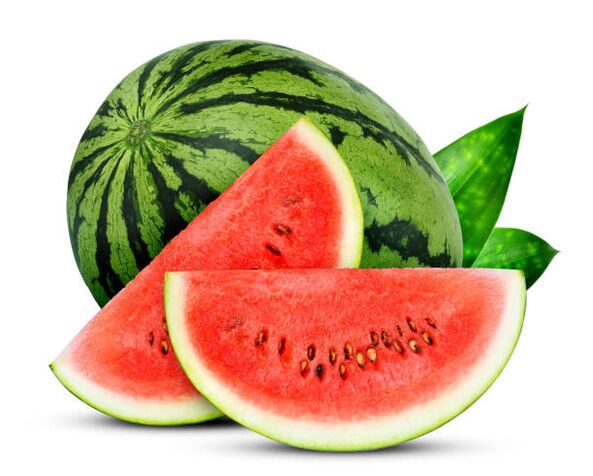Fall is a generous time and the best time to go on a watermelon diet. Why is the watermelon diet good, you ask? Does it suit everyone? What is its specialty? Today I am going to reveal the secrets of the watermelon diet.
The watermelon diet is one of the tastiest mono diets and is very suitable for watermelon lovers. It not only makes it possible to lose weight, but also to improve the health of the entire human body. The watermelon diet is particularly useful for obesity, insomnia, arteriosclerosis, anemia, constipation, arthritis, gout, liver and biliary tract diseases, and strength loss.
The essence of the watermelon diet
During the entire diet, you just need to eat watermelon. Nutritionists believe that 1 kilogram of watermelon should be eaten for every 10 kilograms of body weight, and watermelon should be taken 5-6 times a day. But I want to warn you that if the watermelon is very sweet, weighs 80 kilograms and eats in the proposed mode (you need to eat 8 kilograms), you can not lose weight, only gain it.
It is known that 100 grams of watermelon contain 38 kilocalories, therefore, with a daily requirement of 1500 kilocalories, no more than 4 kilograms of watermelon should be eaten. I propose to take the middle ground: weighing about 60 kilograms (or less), it is allowed to eat up to 3 kilograms of sweet berries weighing more than 70 kilograms - no more than 4 kilograms of fruit if the watermelon is very sweetis.
With such a diet, you can lose up to two kilograms per day.

If you've read my article: The Benefits of Watermelon, remember that watermelon contains soluble sugars (fructose, glucose, maltose, sucrose) as well as fiber and pectin fiber. They accelerate metabolic processes in the body, reduce appetite, remove excess fluid and reduce body fat. All of these contribute to weight loss. In addition, pectin lowers cholesterol and blood sugar levels, removes toxins from the body and normalizes the intestinal flora.
Before starting a watermelon diet, it is worth checking your body's response to active use of watermelon. To do this, consume 400-500 grams of watermelon per day for 3-4 days in addition to the usual diet. If you do not feel unwell (gas, increased bowel movements, heaviness in your stomach), you can start.
Watermelon Diet Options
There are several options for the watermelon diet.
- Fasting Day - a one-day watermelon diet. During the day, you just need to eat watermelon as much as possible (about 5-6 times), but don't get very carried away. Think about the number of calories you are taking each day. Also, remember that the last time a watermelon should be consumed 5 hours before bedtime, to avoid swelling in the morning.
- A lighter option - eat 1-2 kilograms of watermelon 3 times a day 1 hour before meals for 5 days. Then you can eat normal food, but you need to exclude sweet (chocolate, candy, pies) and salty (middle, french fries, pistachios, peanuts).
- 5-day watermelon diet - during this time we eat watermelon like on the fasting day, but you can pamper yourself with 2-3 slices of rye or wholemeal bread if you are very hungry. Bread gives you the energy you need. Remember that the last piece of bread must be eaten before 4 p. m. , otherwise the body will not be able to digest it before going to bed. If you have gastritis, rye bread should be replaced with whole grains.
- Soft diet - allows you to replace watermelon in one of the meals with steamed or boiled vegetables or cereals (breakfast or dinner). It is up to you to decide which option suits you best.
- Combination option - recommended for 4 days
First breakfast: 150-200 grams of low-fat cottage cheese and 3 slices of watermelon.
Second breakfast: 1-2 slices of watermelon.
Lunch: 1 bowl of congee (in water, but you can add salt) and 3 slices of watermelon.
Afternoon snack: 50 grams of low-fat cottage cheese and 1-2 slices of watermelon.
Dinner: 1 bowl of congee (in water, but you can add salt) and 1 slice of watermelon.
This diet option is due to the fact that rice supports the intestines in a normal way (after all, 70% watermelon is liquid) and cottage cheese in the doses used in the diet completely compensates for the loss of calcium with the active ingredient use of watermelon.
After sitting on a watermelon diet for several days, you can lose 3-6 kilograms, but in order to avoid undesirable complications, you need to properly stop the diet. After the end of the diet, it is recommended to eat in a certain mode for 2 weeks: for breakfast - porridge on water (rice, buckwheat, oatmeal) and a small amount of protein foods (cheese, cottage cheese, eggs); for lunch - lean meat, fish, chicken with vegetables, for dinner - watermelon. Then you can lose up to 8 kilograms in 15 days.
Characteristic of the watermelon diet
Not only does this diet help you lose weight, it is a diet of youth and beauty. The diet cleanses the body of toxins and radionuclides, the skin becomes more youthful and elastic, fine wrinkles are smoothed, the complexion improves, cellulite is less pronounced, the hair is given a beautiful shine, the nails are strengthened.
But not everything is so perfect, there are contraindications to the watermelon diet.
Contraindications to the watermelon diet
Watermelon pulp is a powerful diuretic that puts a lot of stress on the kidneys. The watermelon diet is forbidden for kidney stones as it can provoke their movement and lead to kidney colic.
It is contraindicated in pyelonephritis, problems with the gastrointestinal tract, prostate.
In people with cardiovascular diseases, this diet can only be carried out after consulting a doctor, as the diet eliminates potassium and sodium salts from the body, which are so necessary for the functioning of the heart muscle.































































